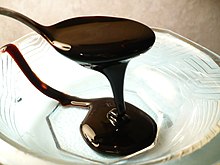
Back Melasse AF Melaza AN دبس السكر Arabic عسل اسمر ARZ মিঠৈ AS Melaza AST Naminas ATJ Меласа Bulgarian Melassa Catalan Melasa Czech

Molasses (/məˈlæsɪz, moʊ-/)[1] is a viscous byproduct, principally obtained from the refining of sugarcane or sugar beet juice into sugar. Molasses varies in the amount of sugar, the method of extraction and age of the plant. Sugarcane molasses is usually used to sweeten and flavour foods. Molasses is a major constituent of fine commercial brown sugar.[2]
Molasses is rich in vitamins and minerals, including vitamin B6, iron, calcium, magnesium, and potassium. There are different types of molasses, including first molasses (highest sugar content), second molasses (slightly bitter), and blackstrap molasses (the darkest and most robust in flavor). Molasses was historically popular in the Americas before the 20th century as a sweetener. It is still commonly used in traditional cuisine, such as in Madeira Island's traditional dishes.
In addition to culinary uses, molasses has industrial applications, such as in the distillation of rum,[3] additive in mortar, and as a soil amendment to promote microbial activity. The unique flavor and nutritional profile of molasses make it a versatile ingredient with both food and non-food applications.
- ^ Wells, John C. (2008). Longman Pronunciation Dictionary (3rd ed.). Longman. ISBN 978-1-4058-8118-0.
- ^ The Codex Alimentarius Commission. (2009; 2010). Codex Alimentarius – 212.1 Scope and Description. Food and Agriculture Organization of the United Nations.
- ^ "Rum | liquor". Encyclopedia Britannica. Archived from the original on 29 December 2017. Retrieved 23 February 2021.